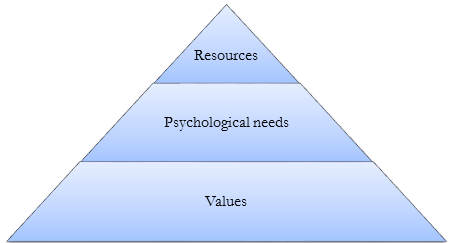Regardless of what you do for work, it’s likely that you interact with someone besides yourself. And where there are people, there is the potential for conflict. Heck, sometimes we even have internal conflict all by ourselves. Conflict can be good or bad depending on how you react to it. If you can identify the cause of the conflict, you’ll be better at knowing how to respond in a constructive way. Although the causes are infinite, they can be categorized into 3 levels:
1) Resources
Resource availability (equipment, materials, labor, schedule, etc.) is a likely source of conflict. This easily shows up when there’s only one truck in the sandbox and two children wanting to play with it. Although we don’t grow out of these needs for resources; we can learn to share them, negotiate, be creative, be patient, etc. Here’s the good news: we can most easily resolve these types of conflicts.
2) Psychological needs
Psychological needs may include power, friendship, belonging, respect, etc. Since we can never be in someone’s head and completely understand what’s going on in there, psychological needs can be very difficult to pinpoint. There are so many needs we have as human beings and trying to guess which one is causing conflict, is just that – a guessing game. Don’t assume that you know the source or try to fix it – that gets us into more trouble sometimes. Instead, take a stance of compassion. After all, we have all experienced psychological needs ourselves and if we are honest, we just might be the ones having needs during a conflict. Ask people questions to try to understand their perspectives. If possible, try addressing the underlying need, in order to resolve the conflict.
3) Values
The reason some people say, “never discuss religion and politics” is because they are ripe for value conflicts. Values are core beliefs that usually don’t change and are linked to psychological needs. Values heavily influence who people are and how they behave. The problem starts when people look at different values as a personal attack and feel like they must fight to defend themselves. “You’re wrong – I’m right” conflicts will never get resolved. So don’t waste your energy. Recognize there is a value conflict and move on to something productive, where you can find agreement.
Many disputes involve a combination of these levels of conflict. The level of difficulty to solve these conflicts increases with each level.
When you are having a conflict or observing one, ask yourself, “What is the root cause?” If it’s a resource level conflict, then use your problem-solving skills to resolve the conflict. If it’s conflict over psychological needs, then ask questions to determine what’s really going on to address the root cause. If it’s a values-based conflict, respect that people have different values than you. It doesn’t mean you respect the values, but that you respect people’s right to have their own beliefs just as you do. Then focus on what you can agree upon.
Remember conflicts can involve two or three levels, so keep asking questions to ensure you are fully addressing all issues. Otherwise, the conflict will not be resolved constructively.
I’ll be speaking at the
Colorado Convention Center on April 29 about “Constructive Conflict on Teams.”
Contact me if you want to educate your people on conflict management to create a healthier, more productive organization.

